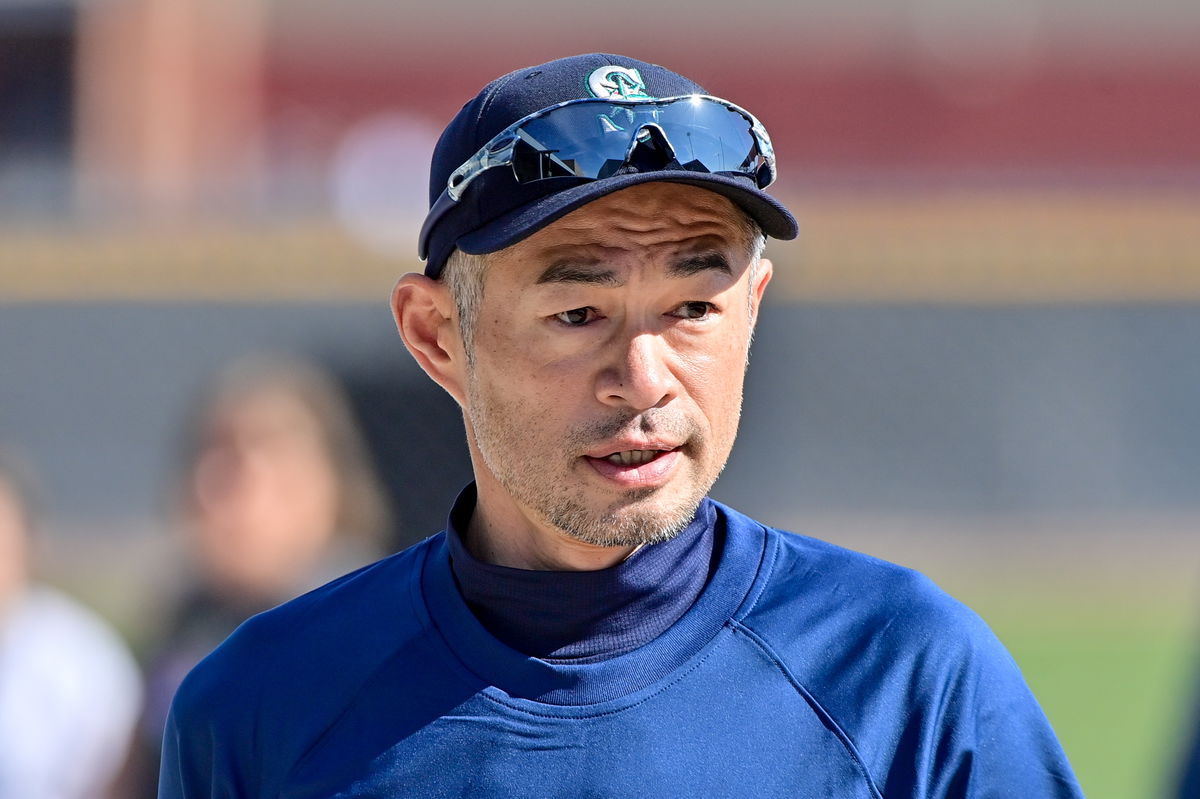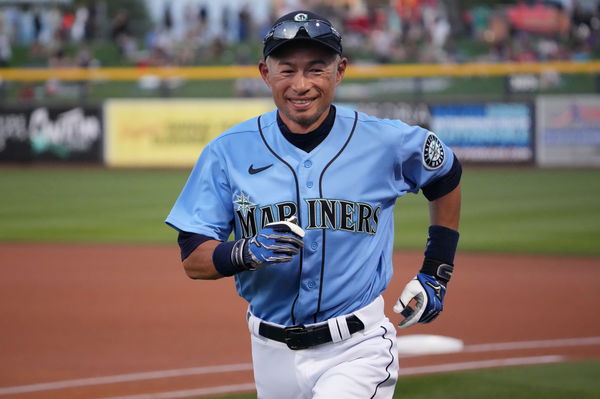
USA Today via Reuters
Feb 15, 2024; Peoria, AZ, USA; Former Seattle Mariners player Ichiro Suzuki looks on during a Spring Training workout at Peoria Sports Complex. Mandatory Credit: Matt Kartozian-USA TODAY Sports

USA Today via Reuters
Feb 15, 2024; Peoria, AZ, USA; Former Seattle Mariners player Ichiro Suzuki looks on during a Spring Training workout at Peoria Sports Complex. Mandatory Credit: Matt Kartozian-USA TODAY Sports
Long before Shohei Ohtani became a global baseball sensation, there was another quiet, focused star who captured the imagination of two countries. With a swing as smooth as silk and a stare as sharp as his throws from right field, Ichiro Suzuki transformed the way the world viewed an international star in MLB. Fans didn’t just watch Ichiro Suzuki — they studied him, tried to mimic his routine, and wondered: where on earth did this guy come from?
Watch What’s Trending Now!
Ichiro Suzuki’s story is not just centered around batting averages and Gold Gloves. Culture, identity, and the weight of a country’s pride were carried admirably on one man’s slender shoulders. His journey across the Pacific was not just a move; it was a whole movement.
To truly understand the depth of the star’s effect, we must first explore where it all started and what Suzuki’s heritage says about the legend himself.
Where is Ichiro Suzuki from? What is his Ethnicity and Nationality?
Ichiro Suzuki was born on October 22, 1973, in Kasugai, Japan. It is a quiet city nestled in Aichi Prefecture. Suzuki grew up in a country where baseball was already beloved; however, the thought of a Japanese position player dominating the American Major Leagues still looked like a dream. The veteran is ethnically Japanese and carries Japanese nationality, a proud product of a baseball culture that emphasizes discipline, fundamentals, and heart.
However, what made him stand out early was not just where the star was from. It was how Ichiro Suzuki played. His unique “pendulum” swing baffled the star’s first professional manager in Japan, costing Suzuki playing time at the period of his rookie season with the Orix Blue Wave. Still, the star kept grinding. By 1994, a new manager let Ichiro be Ichiro — and the outcome? A .385 batting average and a record-setting 210 hits in a single season. Ichiro Suzuki was not just good; he was rewriting the rules of what was possible in Japanese baseball.
That momentum carried the star to the international stage. When Suzuki signed with the Mariners in November 2000, the veteran did not just become the first Japanese-born position player in MLB — Suzuki became a bridge between two baseball countries. While plenty of pitchers had crossed the Pacific before, Ichiro’s move was distinctive. It was bold, historic, and it came with concerns: Could a Japanese hitter thrive against the faster and more aggressive American game?
Suzuki answered that quickly. By 2001, Ichiro had claimed AL Rookie of the Year and MVP honors. That season, he was slashing .350 and dazzling with speed, defense, and unrelenting consistency. From the rice fields of Kasugai to the bright lights of Safeco Field, the star did not just represent Japan — Suzuki elevated it on the international stage.

USA Today via Reuters
Mar 25, 2022; Peoria, Arizona, USA; Seattle Mariners special assistant coach Ichiro Suzuki looks on before the game against the Chicago White Sox at Peoria Sports Complex. Mandatory Credit: Joe Camporeale-USA TODAY Sports
However, Ichiro’s roots were not just a backdrop. They were the base of how the star approached the game and how the world came to understand the star’s greatness.
How his heritage and identity shaped his career
Ichiro was not just a star — he was a cultural ambassador in cleats. His Japanese identity was not tucked away; it was proudly displayed in his daily rituals, the former Yankees star’s respect for the game, and his famously meticulous routine. In Japan, where Suzuki was identified as a symbol of national resilience during the period of tough economic times, his rise brought hope. As Stanford sociologist Kiyoteru Tsutsui said, “He healed the wounds in Japan’s national psyche.”
In multiple ways, Ichiro embodied Japan’s shift on the international stage. The star was not just identified as an athlete; he became, as Tsutsui added, “a great cultural export,” highlighted in the same breath as Hello Kitty, sushi, and manga. The star’s journey mirrored Japan’s transition from being identified as a rigid, economic force to a rich source of global cultural icons.
In the U.S., the star’s success quietly shattered stereotypes. The doubts related to whether a Japanese hitter could succeed in MLB did not just fade — they were obliterated by 10 straight 200-hit seasons, a .311 lifetime average, and more than 4,300 combined professional hits — the most in the history of MLB. All of it done with humility, quiet confidence, and a relentless dedication to craft that stemmed from the star’s heritage.
The former Mariners’ journey highlighted that identity is not a limitation — it is a launchpad. He took pride in being Japanese was not something Suzuki left behind when the veteran crossed the ocean. It was something Suzuki brought with him and something that fueled every sprint to first base, every laser from right field, and every stare from the batter’s box that said, I belong here.

USA Today via Reuters
Apr 15, 2022; Seattle, Washington, USA; Seattle Mariners former outfielder Ichiro Suzuki tosses a ball to the dugout before throwing out the first pitch for a game against the Houston Astros at T-Mobile Park. Mandatory Credit: Joe Nicholson-USA TODAY Sports
Ichiro Suzuki’s ethnicity was never a side note — they were the basis of the star’s story. Suzuki did not just represent Japan on the field; he became a global symbol of excellence. Suzuki’s heritage did not just shape who he was; it shaped how we saw him, and through Suzuki’s journey, baseball did not just gain a star; it gained a veteran who carried a country’s pride with every hit.

